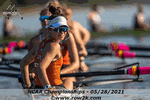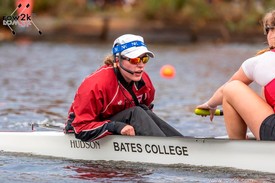In the Driver's Seat: Adrian Ellison OLY
John FX Flynn

This week In The Driver's Seat, we ride with Great Britain's Adrian Ellison, who has been on the rudder for nearly 45 years, and counts among his wins coxing one Steven Redgrave-and the rest of the "Unlikely Boys" as some wag foolishly called them pre-Games--to the 1984 Olympic gold which ended a long GB medal drought...and started Sir Steve's historic run atop the podium.
On this day in 1984, a 22-year old Sir Steve Redgrave won his first Olympic gold.
— Team GB (@TeamGB) August 5, 2017
The rest is history..
?????????? pic.twitter.com/4Qv6RFeaBl
Adrian still hops in the stern regularly. A more recent highlight saw him take the tiller for the Molesey outfit of Team GB Olympians which crushed the then-record time in the Women's Master's Eight at the Charles in 2014, and then repeated in 2015. As he told row2k at the time, "just in the stern of the boat we have 7 Olympic medals," adding that it was an honor to steer a boat full of British Olympians.
Between those wins and a title with 2018 Molesey Masters Four, he's been "Head of the Charles" three times, has won at Henley Royal and Henley Masters, coxes the Molesey "LegEnds" Masters squad, and was the last Worlds medallist to receive his medal from the legendary Thomi Keller--a bronze with the GB Men's 8 in 1989.
Needless to say, we were thrilled when Adrian dropped us an email to say he'd be keen to take part in the Driver's Seat series, so here we go:
row2k - What are the three most important things to being a successful coxswain?
Adrian Ellison - In my opinion, there are far more than three essential aspects to being a successful coxswain, but I'd definitely include competence, confidence and enthusiasm in any list.

Competence means being good at doing what you do; not making mistakes, steering straight and accurately, giving clear and appropriate calls, and generally using your skills and experience to always get the best performance from your crew - in practice and in races.
Confidence is attitude; avoiding over-confidence or arrogance, but nevertheless being sure of yourself and being recognised by your crew and coaches as being in control of yourself, your crew and the overall situation.
Enthusiasm is infectious and inspirational; you can win races from seemingly hopeless positions by convincing your crew that the victory really is achievable, if they'll only trust and believe in you and in each other. Pessimism is equally infectious, and winnable races are often lost simply because a cox had mentally surrendered, leading to the crew following suit.
row2k - What is your favorite drill to run with your crews? Any tips on how to do the drill well, for maximum effectiveness?
Adrian Ellison - I don't really have a favourite drill - they're like a bunch of assorted tools in a tool-box, each of which is the best to deal with a specific problem.
I think one of the most useful drills is the pick-drill, slowly and methodically building up to a complete stroke from arms only, through arms & body-swing, then 1/4 slide, 1/2 slide and 3/4 slide and finally full-slide. I will talk to my crew whilst they're doing the drill - giving tips on what each part is meant to be emphasizing and how to perform it (and what to avoid). I'll praise or be critical if necessary; there's nothing to be gained from doing a drill badly, so I'll keep the crew on one section of the drill until I'm happy that they've mastered it consistently and they're ready to move on to the next part. For maximum effectiveness, I'll make sure that the crew fully understand exactly what to do, and why they're doing it, and what they're aiming for to benefit from doing it! As with nearly everything related to good coxing, it all comes down to excellent communication from the cox to the rowers.
row2k - What's some of the best coaching advice you've received about your coxing?
Adrian Ellison - I've had very, very, little coaching advice specifically about coxing (I've even had famous and well-respected international coaches confess that they didn't know how to coach coxes) but the one stand-out bit of advice I did get was from Jurgen Grobler, relatively early in his reign in charge of the GBR rowing team.

He simply said, "Use the voice, Adrian; use the voice!" What he actually meant was to use the tone of my voice to communicate whether to relax and calm my crew, or to inspire and motivate or to push and spur them on. He wanted me to use a much broader range of speaking-tones, talking to my crews rather than shouting at them.
Another very valuable bit of advice for me came from Olympic gold-medallist, Jonny Searle, who told me not to give rowers more than two technical points to think about at any one time! One at a time is ideal; two is feasible, more than two will just create tension and frustration!
row2k - What is a mid-race call or move that you've made that you'll remember for the rest of your life? What did it involve and how did you call it?
Adrian Ellison - I'm going to bend (or break) the rules here and describe the most memorable call that I didn't actually make myself. In the Olympic men's coxed fours final nearly 40 years ago (Los Angeles, 1984), I'd already delegated the tactical calls to our bowman, Martin Cross, as I'd figured that the crew would react more dramatically to calls for pushes coming from him instead of me, so I just gave a running commentary through the race, which rapidly became a two-horse race between us (GBR) and the USA.
Martin called a push at 1000m - and precisely nothing happened. I stayed exactly opposite the USA stroke's (Ed Ives) footboard, where I'd been for all of the second 500m of the race. Martin called a second push at 750m to go, and still nothing happened (except I remember thinking "This shouldn't be happening!") and then, at 500m remaining, he called one last time; "Push - GO!" and what I remember, but cannot adequately describe, was the hair-raising tone of desperation and total commitment to that do-or-die move.
The crew obviously felt it too, because we just took off, clawed our way past the brave American crew, and took a boat's length off them in that last 500m. I'm proud of my most important call in that race (partly experienced judgement, partly luck) - but I called out "I'm on their bowball - we're a canvas up. Last twenty strokes; - Go!" - and it turned out to be exactly twenty strokes to the finish-line buzzer.
[Ed. note: you can see that sprint in this recap video on the Olympic Channel; it is worth the watch.]
If I may, I'll briefly mention two other calls that I remember, and that may have affected the outcome of a couple of races. At Henley Masters--coxing a Marin Rowing Association eight in a semi-final against a fast British crew who led us all the way up to the last 200m--I called, "You haven't come halfway around the world to lose this race - now show me what you can do!" They pushed ahead to win on the very last stroke of the race.
The other one was in a final in coxed fours at Henley Royal Regatta, coxing a fast club crew racing against four ex-GB team rowers. We took off from the stakeboats like a bat out of hell, and after fifteen strokes I glanced across and saw that we were already a canvas ahead, with our rowing feeling really powerful and under control. I simply said "We're a canvas up, We've got this! Rhythm - Go!" and the guys just slotted into a great race-pace, pulling away so that I never saw the other crew again until the race was finished.
row2k - Can you tell us a bit about how you learned how to make motivating calls?
Adrian Ellison - I'm almost entirely self-taught, but I learned from a very early point in my coxing career to listen to my coaches and my rowers, and to adopt their vocabulary when they're calling to motivate each other. Often, it isn't so much what you say as how you say it. As Grobler told me, it's all in the tone of your voice.
A valuable tip I picked up from yet another GBR Olympic gold medallist was to try to avoid any calls containing the word "Don't"--so say, "Steady the recovery," instead of saying, "Don't rush the recovery."
row2k - Worst race/practice you've ever had?
Adrian Ellison - My worst coxing experiences include racing in a World Championships eights Petite Final with a broken microphone, having to shout all my calls to the crew instead of being able to easily talk to them. After the race, bow four said they hadn't heard a word from me! (Perhaps unsurprisingly, we came last).
I coxed the '84 gold medal crew at the Grunau regatta in Berlin earlier that summer, in a borrowed DDR boat (too small, with rig that we couldn't adjust properly) and with borrowed DDR oars (that we also couldn't change the gearing on as we wanted to). The water was so rough that we almost swamped on the way to the start, so I pulled in to a convenient beach to get out and empty the water out--and it turned out to be a nudist beach. We then got swamped again before starting the race, so I was lying in a bath of cold river-water, sloshing up and down the whole length of the boat, nearly drowning me, and submerging the loudspeakers so the crew couldn't make out a word I was saying. It was a horrible experience, but so ridiculous that the crew were laughing so much that they could barely race!
I've also done long-distance training sessions on the Thames in London in bitterly cold winters, lying down in the bows of fours (and pairs!) when I've had to be pulled out of the boat because I've been literally frozen into place thanks to lying in a puddle of ice for an hour or more.
row2k - Best race/practice you've ever had?
Adrian Ellison - Best race(s): National Team Olympic trials in January 1984. I was chosen to cox a pair consisting of Steve Redgrave--a few months before his first , and my only, Olympic gold medal--paired with Malcolm McGowan, the 7 seat from the GB 1980 Moscow Games silver medal eight. We raced against "my" old 2+, who had won a World Champs bronze in '81, and the Redgrave/McGowan combination just destroyed them, winning by more than 200m, over two 1750m races. The boat felt absolutely amazing; so much power but also total control and stability (a new experience for me!). I've also had two amazing head races (one in London, one at the Head of the Charles) with eights made up of ex-international GB oarswomen, who got together "for fun" and to recapture the enjoyment of making a boat go fast together. It was a wonderful privilege to steer these talented women.

Best practice was just a couple of years ago, coxing four of the same women for a training outing at Marlow, just upriver from Henley. We were the only boat on the river, with mist rising off the water and the sun rising over the trees and hills on the horizon. Without a word from me, the ladies slipped into a beautiful steady-state paddle and I felt there was absolutely nothing I could do or say to improve on what they were doing, for minute after minute. When we eventually had to stop in order to turn the boat around, none of us had said a word for about five minutes, and I was genuinely crying with emotion because of the sheer beauty of the experience.
The good news is that all the thousands of great experiences massively outweigh the few not-so-great ones!
If you enjoy and rely on row2k, we need your help to be able to keep doing all this. Though row2k sometimes looks like a big, outside-funded operation, it mainly runs on enthusiasm and grit. Help us keep it coming, thank you! Learn more.
Comments | Log in to comment |
- Bont Rowing
- Calm Waters Rowing
- Concept 2
- Craftsbury Sculling
- The Crew Classic
- CrewLAB
- Croker
- Dad Vail Regatta
- Durham Boat Co.
- Empacher
- Faster Masters
- Filippi
- Fluidesign
- h2row.net
- HUDSON
- Live2Row Studios
- Nielsen-Kellerman
- Oak Ridge RA
- Peinert Boat Works
- Pocock Racing Shells
- Race1 USA
- RowKraft
- Rubini Jewelers
- Vespoli USA
- WinTech Racing
- Bont Rowing
- Calm Waters Rowing
- Concept 2
- Craftsbury Sculling
- The Crew Classic
- CrewLAB
- Croker
- Dad Vail Regatta
- Durham Boat Co.
- Empacher
- Faster Masters
- Filippi
- Fluidesign
- h2row.net
- HUDSON
- Live2Row Studios
- Nielsen-Kellerman
- Oak Ridge RA
- Peinert Boat Works
- Pocock Racing Shells
- Race1 USA
- RowKraft
- Rubini Jewelers
- Vespoli USA
- WinTech Racing


















04/06/2022 2:31:16 PM